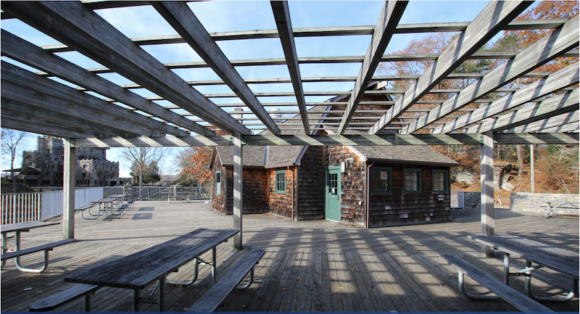
EAST HADDAM, CT – Connecticut Governor Ned Lamont recently announced a new initiative, the mission of which is to expand services and amenities at state parks, such as Gillette Castle in East Haddam and Harkness Memorial Park in Waterford. The Office of Outdoor Industry and Experience is seeking to establish partnerships with businesses, nonprofits, and other private sector entities to enhance the visitor experience.
For example, a restaurateur might be interested in an existing building near the visitor center of the highly popular Gillette Castle state park. The building has an outdoor terrace with a clear view to the striking edifice designed by William Gillette. Annual attendance at the park averages 350,000.
“This is a premier location that attracts visitors from around the world” says Lynn Wilkinson, the president of the Friends of Gillette Castle State Park. “We think the location would also attract locals in late afternoon and evenings as a ‘bring your own beverage’ destination.”
At Harkness Memorial Park, there are buildings that could be renovated to supplement the wedding venue or a bed and breakfast. “There are a number of opportunities for collaborative projects here at Harkness and Gillette and at other Connecticut state parks,” said John Hine, the park supervisor at Harkness. “We already have a successful wedding venue at Harkness State Park and there are buildings, like the Carriage House, that have the potential to add value to the visitor experience.” He pointed out that the park attracts a quarter million visitors a year.
The new office, which is under the Connecticut Department of Energy and Environmental Protection (DEEP), has issued a Request for Information (RFI) and is seeking responses. Information on the many partnership opportunities can be found on the DEEP website at www.portal.ct.gov/DEEP-parks-partnerships.
DEEP welcomes ideas for how the private sector might help elevate outdoor recreation and visitors’ experiences, expand tourism destinations, and provide equitable and sustainable access to the outdoors.
The nonprofit Friends of Gillette Castle will be responding to the RFI as part of a coalition of organizations who are interested in creating a cultural and environmental education center in the former home of Yukitaka Osaki. Yukitaka Osaki was a Japanese immigrant who worked for William Gillette for decades. The two became close friends and after Gillette’s death in 1937, Osaki lived in the cottage until he passed away in 1942. Japanese immigrants were barred from becoming American citizens until 1952.
“Yukitaka Osaki was one of the first Asian immigrants to the region, and like William Gillette, he had an avid appreciation of the beauty of the special location on the Connecticut river,” said Lynn Wilkinson, president of the Friends of Gillette Castle. “We hope that DEEP values the way our proposal respects the unique history of the site, but it is an open and ultimately a competitive process, so anyone with an idea for how to use the building is invited to apply.”
Partnerships between the state and private entities are already in places such as the Essex Steam Train, kayak and canoe rentals, and various food and beverage concessions. Connecticut’s $4.6 billion outdoor recreation economy is the second largest in New England and has demonstrated robust growth each year since the pandemic—expanding by 20 percent in 2021 and by another 11 percent in 2022, according to the DEEP. Total park visitation in 2022 was estimated to be 17 million.
Editor’s Note: This article is based on a press release issued by The Friends of Gillette Castle.